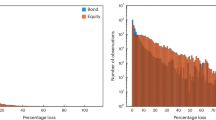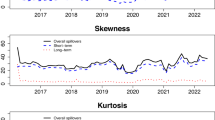Abstract
In recent years, the investment community has become increasingly aware of the investment risks from both the physical effects of climate change and the regulatory responses to facilitate the transition to a net-zero economy. The potential impact of climate transition risks is especially large for fossil energy companies, given their central role in producing carbon emissions. Here we discuss how concerns about climate risks influence the way investors allocate their capital and exercise their oversight of firms, and how this investor response affects companies in the energy sector. We then explore how different energy firms have responded to climate-related pressures from their investors and other stakeholders. We conclude by highlighting promising areas of research for understanding how climate risks affect the interaction between financial markets and the energy sector.
This is a preview of subscription content, access via your institution
Access options
Access to this article via ICE Institution of Civil Engineers is not available.
Access Nature and 54 other Nature Portfolio journals
Get Nature+, our best-value online-access subscription
$29.99 / 30 days
cancel any time
Subscribe to this journal
Receive 12 digital issues and online access to articles
$119.00 per year
only $9.92 per issue
Buy this article
- Purchase on SpringerLink
- Instant access to full article PDF
Prices may be subject to local taxes which are calculated during checkout

Similar content being viewed by others
References
Coqueret, G., Perspectives in ESG equity investing. SSRN https://doi.org/10.2139/ssrn.3715753 (2020).
Stroebel, J. & Wurgler, J. What do you think about climate finance? J. Financ. Econ. 142, 487–498 (2021).
Giglio, S., Kelly, B. & Stroebel, J. 2021. Climate finance. Annu. Rev. Financ. Econ. 13, 15–36 (2021).
Engle, R. F., Giglio, S., Kelly, B., Lee, H. & Stroebel, J. Hedging climate change news. Rev. Financ. Stud. 33, 1184–1216 (2020). The returns of portfolios of stocks sorted on environmental scores co-move with a measure of climate news, indicating that stock prices move in response to climate risk.
Giglio, S., Maggiori, M., Rao, K., Stroebel, J. & Weber, A. Climate change and long-run discount rates: evidence from real estate. Rev. Financ. Stud. 34, 3527–3571 (2021). The prices of houses exposed to sea-level rise risk drop in value (relative to houses not exposed) when real estate participants pay more attention to climate risks, indicating that real estate prices reflect those risks.
Keys, B. J. & Mulder, P. Neglected No More: Housing Markets, Mortgage Lending, and Sea Level Rise Working Paper No. 27930 (NBER, 2020).
Painter, M. An inconvenient cost: the effects of climate change on municipal bonds. J. Financ. Econ. 135, 468–482 (2020).
Krueger, P., Sautner, Z. & Starks, L. T. The importance of climate risks for institutional investors. Rev. Financ. Stud. 33, 1067–1111 (2020).
Climate Leadership in the Eleventh Hour (United Nations Global Compact and Accenture, 2021); https://www.accenture.com/_acnmedia/PDF-166/Accenture-UNGC-CEO-Study-Sustainability-2021.pdf#zoom=40
Gensler, G. Prepared remarks before the principles for responsible investment ‘Climate and global financial markets’ webinar. US Securities and Exchange Commission https://www.sec.gov/news/speech/gensler-pri-2021-07-28 (2021).
Berg, F., Kölbel, J. F. & Rigobon, R. Aggregate confusion: the divergence of ESG ratings. SSRN https://doi.org/10.2139/ssrn.3438533 (2020).
Billio, M., Costola, M., Hristova, I., Latino, C. & Pelizzon, L. Inside the ESG ratings: (dis)agreement and performance. SSRN https://doi.org/10.2139/ssrn.3659271 (2020).
Flammer, C., Toffel, M. W. & Viswanathan, K. Shareholder activism and firms’ voluntary disclosure of climate change risks. Strateg. Manag. J. 42, 1850–1979 (2021).
Bolton, P. & Kacperczyk, M. Carbon disclosure and the cost of capital. SSRN https://doi.org/10.2139/ssrn.3755613 (2021). In a large international panel of firms, disclosures of carbon emissions are associated with a lower cost of capital, as well as higher valuations; a quasi-natural experiment, the 2013 mandate of carbon disclosure in the United Kingdom, suggests that the effect is at least partially due to lower uncertainty.
Hertwich, E. G. & Wood, R. The growing importance of scope 3 greenhouse gas emissions from industry. Environ. Res. Lett. 13, 104013 (2018).
Baker, B. Scope 3 carbon emissions: seeing the full picture. MSCI https://www.msci.com/www/blog-posts/scope-3-carbon-emissions-seeing/02092372761 (2020).
Contreras, W. et al. Life cycle greenhouse gas emissions of crude oil and natural gas from the Delaware Basin. J. Clean. Prod. 328, 129530 (2021).
The Enhancement and Standardization of Climate-Related Disclosures for Investors (Securities and Exchange Commission, 2022); https://www.sec.gov/rules/proposed/2022/33-11042.pdf
Hoepner, A. G., Oikonomou, I., Sautner, Z., Starks, L. T. & Zhou, X. ESG shareholder engagement and downside risk. SSRN https://doi.org/10.2139/ssrn.2874252 (2021).
Phillips, M. Exxon’s board defeat signals the rise of social-good activists. The New York Times (9 June 2021); https://www.nytimes.com/2021/06/09/business/exxon-mobil-engine-no1-activist.html
Reenergize Exxon: Investor Presentation (Engine No. 1, 2021); https://assets.contentstack.io/v3/assets/bltc7c628ccc85453af/blte1b22222cb59fa46/611e278df30c8713cf6e7121/Investor-Presentation-May-2021-v2.pdf
Chevron investors back proposal for more emissions cuts. Reuters (26 May 2021); https://www.reuters.com/business/energy/chevron-shareholders-approve-proposal-cut-customer-emissions-2021-05-26/
Hartzmark, S. M. & Sussman, A. B. Do investors value sustainability? A natural experiment examining ranking and fund flows. J. Finance 74, 2789–2837 (2019).
Coal Divestment (Institute for Energy Economics and Financial Analysis, 2021); https://ieefa.org/asset-managers-leaving-coal/
Global Fossil Fuel Divestment Commitments Database (Stand.earth, 2022); https://gofossilfree.org/divestment/commitments/
Andersson, M., Bolton, P. & Samama, F. Hedging climate risk. Financ. Anal. J. 72, 13–32 (2016).
Engle, R. F., Giglio, S., Kelly, B., Lee, H. & Stroebel, J. Hedging climate change news. Rev. Financ. Stud. 33, 1184–1216 (2020).
Alekseev, G., Giglio, S., Maingi, Q., Selgrad, J. & Stroebel, J. A Quantity-Based Approach to Constructing Climate Risk Hedge Portfolios Working Paper (2021); https://pages.stern.nyu.edu/~jstroebe/PDF/AGMSS_QuantityClimateHedge.pdf
Plantinga, A. & Scholtens, B. The financial impact of fossil fuel divestment. Clim. Policy 21, 107–119 (2021).
Ansar, A., Caldecott, B. & Tilbury, J. Stranded Assets and the Fossil Fuel Divestment Campaign: What Does Divestment Mean for the Valuation of Fossil Fuel Assets? (SSEE and University of Oxford, 2013); https://www.smithschool.ox.ac.uk/publications/reports/SAP-divestment-report-final.pdf
Sanzillo, T., Hipple, K. & Williams-Derry, C. The Financial Case for Fossil Fuel Divestment (Sightline Institute and IEEFA, 2018); http://ieefa.org/wp-content/uploads/2018/07/Divestment-from-Fossil-Fuels_The-Financial-Case_July-2018.pdf
Pedersen, L. H., Fitzgibbons, S. & Pomorski, L. Responsible investing: the ESG-efficient frontier. J. Financ. Econ. 142, 572–597 (2021).
Berk, J. & van Binsbergen, J. H. The impact of impact investing. SSRN https://doi.org/10.2139/ssrn.3909166 (2021).
Broccardo, E., Hart, O. D. & Zingales, L. Exit vs. Voice Working Paper No. 694/202 (ECGI Finance, 2021). A theoretical analysis of the choice between divestment and engagement shows that engagement can be more effective than divestment in affecting firm environmental decisions.
Report on Benchmarks (EU Technical Expert Group on Sustainable Finance, 2019); https://ec.europa.eu/info/sites/default/files/business_economy_euro/banking_and_finance/documents/192020-sustainable-finance-teg-benchmarks-handbook_en_0.pdf
Marathon Oil announces executive compensation changes and GHG emissions intensity reduction initiatives. News release. Marathon Oil Corporation https://ir.marathonoil.com/2021-01-27-Marathon-Oil-Announces-Executive-Compensation-Changes-and-GHG-Emissions-Intensity-Reduction-Initiatives (2021).
Comfort, N. ECB says just 15% of banks disclose financed CO2 emissions. Bloomberg (14 March 2022); https://www.bloomberg.com/news/articles/2022-03-14/ecb-says-banks-still-need-to-make-progress-on-climate-disclosure
Greenstone, M. & Nath, I. Do renewable portfolio standards deliver cost-effective carbon abatement? SSRN https://doi.org/10.2139/ssrn.3374942 (2021).
Pastor, L., Stambough, R. F. & Taylor, L. A. Sustainable investing in equilibrium. J. Financ. Econ. 142, 550–571 (2021).
Ritchie, H., Rosado, P. & Roser, M. Energy Mix (Our World in Data, 2020); https://ourworldindata.org/energy-mix
Stulz, R. Optimal hedging policies. J. Financ. Quant. Anal. 19, 127–140 (1984).
Breeden, D. T. & Viswanathan, S. Why do firms hedge? An asymmetric information model. J. Fixed Income 25, 7–25 (2015).
Froot, K. A., Scharfstein, D. S. & Stein, J. C. Risk management: coordinating corporate investment and financing policies. J. Finance 48, 1629–1658 (1993).
BP 2Q 2021 Results: Webcast Q&A Transcript (BP, 2021); https://www.bp.com/content/dam/bp/business-sites/en/global/corporate/pdfs/investors/bp-second-quarter-2021-results-qa-transcript.pdf
BP completes entry into offshore Wind, with strategic partner Equinor. Press release. BP https://www.bp.com/en_us/united-states/home/news/press-releases/bp-completes-entry-into-offshore-wind-with-strategic-partner-equinor.html (2021).
Topham, G. Shell aims to install 50,000 on-street EV charge points by 2025. The Guardian (1 September 2021); https://www.theguardian.com/business/2021/sep/01/shell-on-street-ev-charge-points-2025
Iraq: TotalEnergies signs major agreements for the sustainable development of the Basra region natural resources. Press release. TotalEnergies https://totalenergies.com/media/news/press-releases/iraq-totalenergies-signs-major-agreements-sustainable-development-basra (2021).
Reed, S. & Moses, C. A Dutch court rules that Shell must step up its climate change efforts. The New York Times (26 May 2021); https://www.nytimes.com/2021/05/26/business/royal-dutch-shell-climate-change.html
From international oil company to integrated energy company: BP sets out strategy for decade of delivery towards net zero ambition. Press release. BP https://www.bp.com/en/global/corporate/news-and-insights/press-releases/from-international-oil-company-to-integrated-energy-company-bp-sets-out-strategy-for-decade-of-delivery-towards-net-zero-ambition.html (2020).
Eni’s commitment to protecting and conserving forests. Eni https://www.eni.com/en-IT/low-carbon/forest-protection-conservation.html (2021).
van Benthem, A. A. & Kerr, S. Scale and transfers in international emissions offset programs. J. Public Econ. 107, 31–46 (2013).
Kreibich, N. & Hermwille, L. Caught in between: credibility and feasibility of the voluntary carbon market post-2020. Clim. Policy 21, 939–957 (2021).
Use of international credits. European Commission https://ec.europa.eu/clima/eu-action/eu-emissions-trading-system-eu-ets/use-international-credits_en (2022).
Stankiewicz, K. Chevron CEO explains why the oil giant’s lower-carbon investments look past wind and solar energy. CNBC (15 September 2021); https://www.cnbc.com/2021/09/15/chevron-ceo-mike-wirth-on-the-oil-giants-lower-carbon-investments.html
Brandt, A. R. et al. Methane leaks from North American natural gas systems. Science 343, 733–735 (2014).
ExxonMobil announces emission reduction plans; expects to meet 2020 goals. Press release. ExxonMobil https://corporate.exxonmobil.com/News/Newsroom/News-releases/2020/1214_ExxonMobil-announces-2025-emissions-reductions_expects-to-meet-2020-plan (2020).
ConocoPhillips adopts paris-aligned climate risk framework to meet net-zero operational emissions ambition by 2050. Press release. ConocoPhillips https://www.conocophillips.com/sustainability/sustainability-news/story/conocophillips-adopts-paris-aligned-climate-risk-framework-to-meet-net-zero-operational-emissions-ambition-by-2050/ (2020).
Crifo, P., Forget, V. D. & Teyssier, S. The price of environmental, social and governance practice disclosure: an experiment with professional private equity investors. J. Corp. Finance 30, 168–194 (2015). A field experiment in which professional private equity investors competed in closed auctions to acquire fictive firms demonstrates that ESG performance disclosure impacts firm valuation and investment decisions, with investors reacting more to bad ESG practice disclosure than to good ESG practice.
Private equity’s ESG journey: from compliance to value creation. Global private equity responsible investment survey 2021. PriceWaterhouseCoopers https://www.pwc.com/gx/en/services/sustainability/publications/private-equity-and-the-responsible-investment-survey.html (2021).
Environment and climate change. Saudi Aramco https://www.aramco.com/en/investors/environmental-social-and-governance/environment-and-climate-change (2022).
Saudi Aramco joins World Bank’s initiative: ‘Zero Routine Flaring by 2030’. Press release. Saudi Aramco https://www.aramco.com/en/news-media/news/2019/zero-routine-flaring-by-2030-initiative (2019).
Lemoine, D. & Traeger, C. Watch your step: optimal policy in a clipping climate. Am. Econ. J. Econ. Policy 6, 137–166 (2014).
Golosov, M., Hassler, J., Krusell, P. & Tsyvinski, A. Optimal taxes on fossil fuel in general equilibrium. Econometrica 82, 41–88 (2014).
Shell scenarios. Shell https://www.shell.com/energy-and-innovation/the-energy-future/scenarios.html (2022).
State and Trends of Carbon Pricing 2020 (World Bank, 2020); https://openknowledge.worldbank.org/handle/10986/33809
Perino, G., Ritz, R. A. & van Benthem, A. A. Overlapping Climate Policies Working Paper No. 25643 (NBER, 2020).
Goulder, L. H. & Morgenstern, R. D. China’s rate-based approach to reducing CO2 emissions: attractions, limitations, and alternatives. AEA Pap. Proc. 108, 458–462 (2018).
Borenstein, S., Bushnell, J., Wolak, F. A. & Zaragoza-Watkins, M. Expecting the unexpected: emissions uncertainty and environmental market design. Am. Econ. Rev. 109, 3953–3977 (2019). Large uncertainty in business-as-usual emissions implies that the market price in an emissions-trading system is very likely to be determined by an administrative price floor or ceiling.
Perino, G. New EU ETS Phase 4 rules temporarily puncture waterbed. Nat. Clim. Change 8, 262–264 (2018).
Gerlagh, R., Heijmans, R. J. R. K. & Rosendahl, K. E. An endogenous emissions cap produces a green paradox. Econ. Policy 36, 485–522 (2021).
Lamont, O. Cash flow and investment: evidence from internal capital markets. J. Finance 52, 83–109 (1997). During the 1986 oil price decrease, oil companies significantly reduced their non-oil investment, providing evidence that a decrease in cash/collateral decreases investment, holding fixed the profitability of investment, and that the finance costs of different parts of the same corporation are interdependent.
Gertner, R., Powers, E. & Scharfstein, D. Learning about internal capital markets from corporate spin-offs. J. Finance 57, 2479–2506 (2002).
Baker, M., Bergstresser, D., Serafeim, G. & Wurgler, J. Financing the Response to Climate Change: The Pricing and Ownership of US Green Bonds Working Paper No. 25194 (NBER, 2018).
Lombardo, C. & McFarlane, S. Third Point has big Shell stake, urges energy giant to break up. The Wall Street Journal (27 October 2021); https://www.wsj.com/articles/third-point-has-big-shell-stake-urges-energy-giant-to-break-up-11635349151
Aldy, J. E., Bento, N. & Gianfrate, G. National climate policies and corporate internal carbon pricing. Energy J. 42, 1944–1989 (2021).
French, D. & Resnick-ault, J. Shell exits Permian with $9.5 bln Texas shale sale to ConocoPhillips. Reuters (21 September 2021); https://www.reuters.com/business/shell-nears-deal-sell-texas-shale-assets-conocophillips-95-bln-wsj-2021-09-20/
Dai, R., Duan, R., Liang, H. & Ng, L. Outsourcing Climate Change Working Paper No. 723/2021 (ECGI, 2022).
Fowlie, M. L. Incomplete environmental regulation, imperfect competition, and emissions leakage. Am. Econ. J. Econ. Policy 1, 72–112 (2009). The incomplete, market-based regulation of carbon dioxide emissions in California’s electricity sector that exempted out-of-state producers achieved approximately one-third of the total emissions reductions that could have been achieved under complete regulation at more than twice the cost per ton.
Goulder, L. H., Jacobsen, M. R. & van Benthem, A. A. Unintended consequences from nested state and federal regulations: the case of the Pavley greenhouse-gas-per-mile limits. J. Environ. Econ. Manag. 63, 187–207 (2012).
Greenstone, M. The impacts of environmental regulations on industrial activity: evidence from the 1970 and 1977 Clean Air Amendments and the Census of Manufacturers. J. Polit. Econ. 110, 1175–1219 (2002).
Martin, R., Muuls, M., de Preux, L. B. & Wagner, U. J. Industry compensation under relocation risk: a firm-level analysis of the EU Emissions Trading Scheme. Am. Econ. Rev. 104, 2482–2508 (2014).
Fowlie, M., Petersen, C. & Reguant, M. Border carbon adjustments when carbon intensity varies across producers: evidence from California. AEA Pap. Proc. 111, 401–405 (2021).
Perino, G., Willner, M., Quemin, S. & Pahle, M. The European Union emissions trading system market stability reserve: does it stabilize or destabilize the market? Rev. Environ. Econ. Policy 16 https://www.journals.uchicago.edu/doi/abs/10.1086/721015 (2022).
Colmer, J., Calel, R., Dechezleprêtre, A. & Glachant, M. Do Carbon Offsets Offset Carbon? Working Paper (2022); http://eprints.lse.ac.uk/112803/1/GRI_do_carbon_offsets_offset_carbon_paper_371.pdf
Author information
Authors and Affiliations
Corresponding author
Ethics declarations
Competing interests
A.A.v.B. holds mutual funds that invest in publicly traded clean energy companies and related industries. E.S. is currently a Sustainability Risk Manager within BlackRock’s Risk and Quantitative Analysis (RQA) group. E.C. is vice-chair, Americas, at Wood Mackenzie. S.G. has received compensation in excess of US$10,000 from D. E. Shaw over the past three years. J.S. is also a member of the Climate-Related Market Risk Subcommittee at the Commodities and Futures Trading Commission (CFTC), an unpaid position. He also holds mutual funds that invest in publicly traded energy companies and related industries.
Peer review
Peer review information
Nature Energy thanks Paul Griffin and the other, anonymous, reviewer(s) for their contribution to the peer review of this work.
Additional information
Publisher’s note Springer Nature remains neutral with regard to jurisdictional claims in published maps and institutional affiliations.
Rights and permissions
About this article
Cite this article
van Benthem, A.A., Crooks, E., Giglio, S. et al. The effect of climate risks on the interactions between financial markets and energy companies. Nat Energy 7, 690–697 (2022). https://doi.org/10.1038/s41560-022-01070-1
Received:
Accepted:
Published:
Issue Date:
DOI: https://doi.org/10.1038/s41560-022-01070-1



